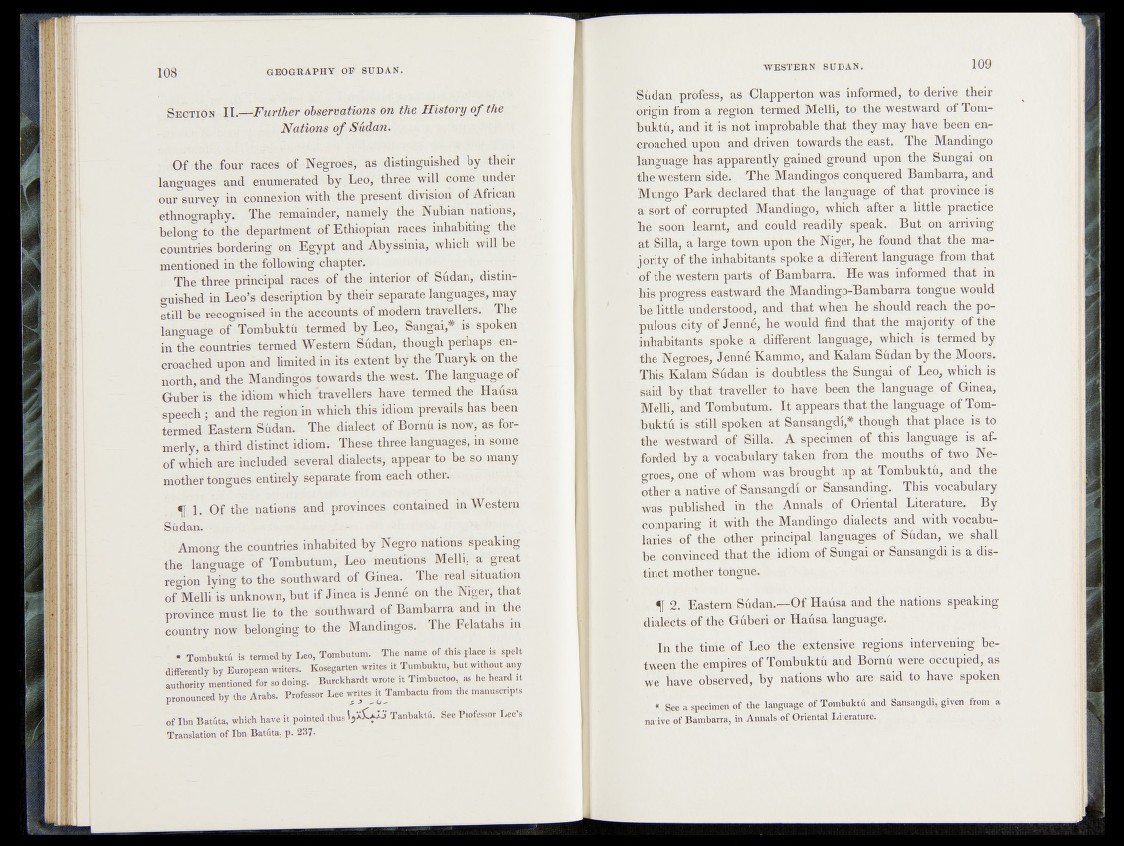
S e c t io n II.—Further observations on the History of the
NaMons of Sudan.
Of the four races of Negroes, as distinguished by their
languages and enumerated by , Leo, three will come under
our survey in . connexion with the present division of African
ethnography." The remainder, namely the Nubian nations,
belong to the department of Ethiopian races inhabiting the
countries bordering on Egypt and Abyssinia, which will be
mentioned in the following chapter.
The three principal races of the interior of Sudan, distinguished
in Leo’s description by their separate languages, may
still be recognised in the accounts of modem travellers. The
language of Tombuktu termed by Leo, Sangai,*ris spoken
in the countries termed Western Sudan, though perhaps - encroached
upon and limited in its extent by the Tuaryk on the
north, and the Mandingos towards the _west. The language of
Guberis the idiom which travellers have termed the Hausa
speech ; and the region in which this idiom prevails has been
termed Eastern Sudan. The dialect of Borah is now, as for^
merly, a third distinct idiom. These three languages, in some
of which are included several dialects, appear to be so;many
mother tongues entirely separate from each other.
^ 1. Of the nations and provinces contained in Western
Sudan.
Among the countries inhabited by Negro nations speaking
the language of Tombutum, Leo mentions Melli, a great
region lying to the southward of Ginea. The real situation
of Melli is unknown, but if Jinea is Jenne on the Niger, that
province must lie to the southward of Bambarra and in the
country now belonging to the Mandingos. The Felatahs in
* Tombuktd is termed by Leo, Tombutum. The name of .this place is spelt
differently by European writers. Kosegarten writes it Tumbuktu, but without any
authority mentioned for so doing. Burckhardt wrote it Timbuctoo, as he heard tt
pronounced by the Arabs. Professor Lee writes^it Tambactu from the manuscripts
of Ibn Batuta, which have it pointed thus Tanbakld. See Professor Lee’s
Translation of Ibn Batuta, p. 237.
Sudan profess, as Clapperton was informed, to derive their
origin from a region termed Melli, to the westward of Tombuktu,
and it is not improbable that they may have been encroached
upon and driven towards the east. The ; Mandingo
language has apparently gained ground upon the Sungai on
the western side. - The Mandingos conquered Bambarra, and
Mungo Park declared that the language of that province is
a sort of corrupted Mandingo, which after a little practice
he soon learnt, and could readily speak. But on arriving
at Silla, a large town upon the Niger, he found that the majority
of the inhabitants spoke a 'different language from that
' of the western parts of Bambarra. He was informed that in
his progress eastward the Mandingo-Bambarra tongue would
be little understood, and that when he should,reach the populous
city of Jenrié, he would find that the maj ority of the
inhabitants spoke a different language, which is termed by
the Negroes, Jenné Kammo, and Kalam Sudan by the Moors.
This Kalam Shdan is doubtless the Sungai. of Leo, which is
said by that, traveller to have been the language; of Ginea,
Melli, and Tombutum. It appears that the language of Tombuktû
is .still spoken at Sansangdi,* though that place is to
the westward of Silla. A specimen .oL this language is afforded
by a vocabulary taken from the mouths of two Negroes,
one of whom was brought ^ap at Tombuktu, and the
othe/a native of Sansangdi or|Sansanding. This vocabulary
was published in the Annals of Oriental Literature. By
comparing it with the Mandingo dialects and with, vocabularies
of the other principal languages of Sûdan, we shall
be convinced that the idiom of Sungai or Sansangdi is a distinct
mother tongue.
f 2. Eastern Sudan.—Of Hausa and the nations speaking
dialects of the Gûberi or Hausa language;
In the time of Leo the extensive regions" intervening between
the empires of Tombuktû and Bornu were occupied, as
we have observed, by nations who are said to have spoken
* See a specimen of the language of Tombuktû and Sansangdi, given from a
native of Bambarra, in Annals of Oriental Literature.